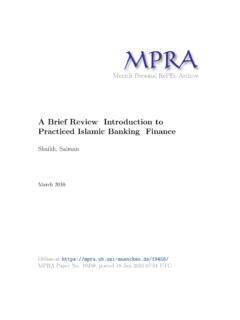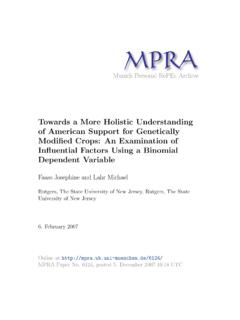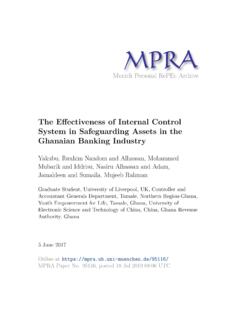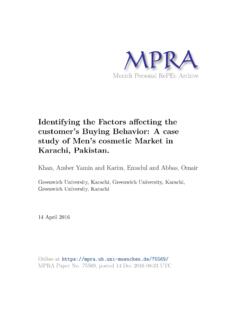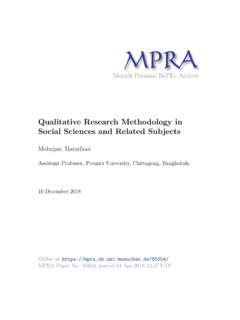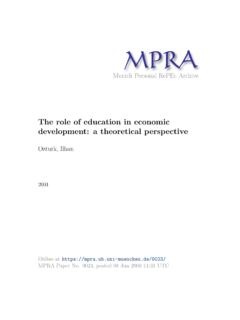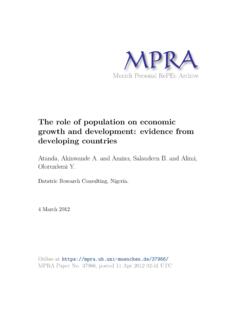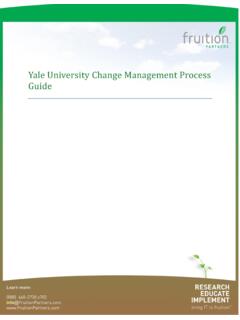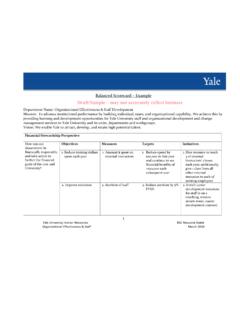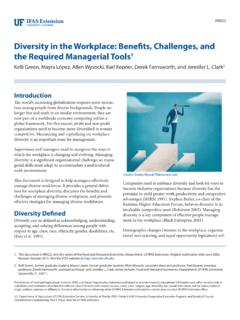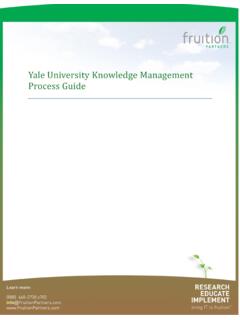Transcription of Principles and Contributions of Total Quality Mangement ...
1 Munich Personal RePEc ArchivePrinciples and Contributions of TotalQuality Mangement (TQM) Gurus onBusiness Quality ImprovementNeyestani, BehnamDepartment of Civil Engineering, De La Salle university , Manila,Philippines1 February 2017 Online Paper No. 77282, posted 04 Mar 2017 09:12 UTC1 Principles and Contributions of Total QualityMangement (TQM) Gurus on BusinessQuality ImprovementBehnam Neyestani Department of Civil Engineering, De La Salle university , Manila, Philippines behnam_neyestani @ : Over the past few decades, Total Quality management (TQM)gurus have been developed certain theories in the area of business qualityimprovement, which caused a huge paradigm shift in improving the Quality ofproducts and services. The main aim of this paper was to discuss regardingthe key roles of TQM gurus such as Deming, Crosby, Juran, Feigenbaum,Ishikawa, and others in improving business Quality within differentorganizations in 20th Century.
2 Thus, a systematic literature review wasperformed to specify the concept of TQM Principles and philosophies from theaforementioned TQM gurus. However, the literature review was providedinvaluable insight on the understanding of the main ideas and philosophiesproposed by these TQM : Contributions , Quality management , TQM Gurus, Total QualityManagement (TQM), and Total Quality management (TQM) is a set of opinions and ideas forimproving the Quality of products or services, which widely called management philosophy . Its main aims are to satisfy customers andsurvive in the market [20]. Without doubt, Quality experts (gurus) had thesignificant roles to expend and transform the concept of Quality from a meretechnical system to a broader body of knowledge known as Total Quality withmanagement implications in production [18].
3 Historically, TQM was firstemerged by the Contributions of Quality gurus, such as Deming and Juran inJapan after Second World War. Then Crosby, Feigenbaum, Ishikawa, andothers had developed this powerful management technique for improvingbusiness Quality within the organizations. During the period 1980s to 1990s,Neyestani B. (2017, February). Principles and Contributions of Total Quality Mangement (TQM) Gurus on Business Quality Improvement. 2many national and international Quality awards (QAs) have been establishedto provide guidelines for implementing TQM based on the suggestions andtheories of TQM gurus [19], [20]. Guru means a respected teacher , spiritual leader , good person , awise person who in his field has not only made a great contribution andinnovation, but also a large-scale revolution.
4 People who have establishedthemselves and profiled philosophical trends in Quality , are the gurus ofquality [1]. The gurus extensively made substantial contribution to qualitymanagement by their theories in improving Quality . TQM techniques and toolscould be innovated by these theories [2]. As demonstrated in Table 1, each ofthese pioneers provided foundational building blocks for a systematic methodto focus on Total Quality management [4].Table 1: TQM Gurus [4]Pioneer Year Quality AV. Feigenbaun Koaru Ishikawa Philip B. Crosby Joseph M. Juran1950196119791979198814 Principles in Quality , 7 deadly sins and diseases / PDCA. Concept: Make it right at the first time (One Basic TQM). Statistical Approach in Quality Control and Fishbone. Top management in Quality , 14 steps for Quality improvement.
5 Cost of the Quality , SPC Quality , and Juran's Quality triangle. Deming [9] worked with statistical sampling to improve Quality and alsointroduced the concept of "Variance to the Japanese and a systematicapproach to problem solving which eventually was called the Plan, Do,Check, Act or PDCA Cycle. Joseph Juran expanded the tool set available forproducing Quality products and managing organization-wide Quality byintroducing the Pareto Principle as an application of statistics to prioritizingprocess improvements [15]. Philip Crosby popularized the Cost of Qualityconcept [6]. Feigenbaum was the firs guru, who defined Total QualityControl as an effective system for integrating the Quality -development, Quality -maintenance, and Quality -improvement efforts of the various groupsin an organization to enable marketing, engineering, production and serviceat the most economical levels which allows for full customer satisfaction [10].
6 Kaoru Ishikawa is considered by many researchers to be the founder and firstpromoter of the Fishbone diagram (or Cause-and-Effect Diagram) for rootcause analysis and the concept of Quality Control (QC) circles [14]. Thesetheorists are regarded as the key founders of TQM philosophy, and the originof TQM concept evolves mostly from their work. Therefore, to understandTQM content and its process in improving business Quality , this paper wasreviewed literature and discussed concerning the works and Principles of fiveinfluential gurus [6], [9], [10], [14], [15] had a considerable influence on thedevelopment of TQM in the B. (2017, February). Principles and Contributions of Total Quality Mangement (TQM) Gurus on Business Quality Improvement. 3 Deming's Contribution and Principles Dr.
7 W. Edwards Deming has emerged as the most influential quru ofquality management in the United States and Japan, he is best known for the Deming Cycle , his Fourteen Points , and the Seven Deadly Diseases [12].Deming was graduated in engineering and physics at the university ofWyoming and yale university . He was influenced by Dr. Shewhart'sphilosophical idea for Quality in developing control chart and PDSA cycle(Shewhart cycle), when he was working for Western Electric. Deming haddeveloped and adopted PDSA cycle (Shewhart cycle) to clerical tasks afterleaving Western Electric. During the period 1927 to early 1940, he hadpioneered the utilization of statistics and sampling methods successfully atthe Department of Agriculture.
8 During Second World War, Deming washired by the War Department and the Census Bureau to implement controlcharts and sampling techniques [16], [17]. After war, he helped Japanesecompanies to improve the Quality of their products by his Quality principlesand guidances as a consultant. In early 1950s, Japanese products were burdened with defects and wereknown as poor Quality products with the product of other countries incontrast. He emphasized to Japanese that the most of the troubles inproduction are with the process and that statistics can be used to controlthat process [23]. The results of the consultancy of Deming was exceedinglypositive to the products and industries of Japan. He became as a hero theresoon. To appreciate of Deming's efforts in Japan, JUSE established the Deming Prize in 1951.
9 He was awarded the Second Order Medal of theSacred Treasure by Emperor Hirohito in 1960 [24]. As mentioned earlier, Deming [9] developed the Shewhart cycle (PDSA) asan important framework to lead improvement for Quality and productivity, hisfour steps for Improvement, or Plan-Do-Check-Act, are often called the PDCA cycle, as demonstrated in Figure 1. Nowadays, Deming's cycle has beenextensively apply in the development and deployment of Quality policies,DMAIC (Six Sigma) and DMADV (DFSS) have added the rigour of project life-cycle (PLC) to the implementation and close-out of Six Sigma projects,RADAR (EFQM Excellence model) has been used for assessment oforganizational performance [25]. Furthermore, management systemstandards such as ISO 9001 can improve the efficiency of the processes ofthe organizations through Plan-Do-Check-Act (PDCA) methodology toachieve successfully the satisfaction of customer and Quality objectives [21].
10 Neyestani B. (2017, February). Principles and Contributions of Total Quality Mangement (TQM) Gurus on Business Quality Improvement. 4 Figure 1: The PDCA cycle [9] Also, Deming [9] drew his famous system diagram that has shownthe importance of assuming of the production in terms of a system . Heargued how good Quality should be begun from requirements of customersthat need to obtain resources by the suppliers first, and after processes ofproducing products, the products will be delivered to the customers idea that considers the supplier and customer as a part of the productionsystem was quite revolutionary at the time. Figure 2 shows the production asa system that interralates to internal and external 2: Production viewed as a system [9] However, Deming did not specify Quality in a single phrase.
